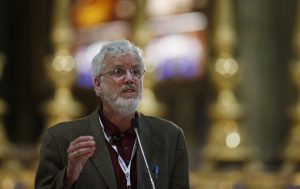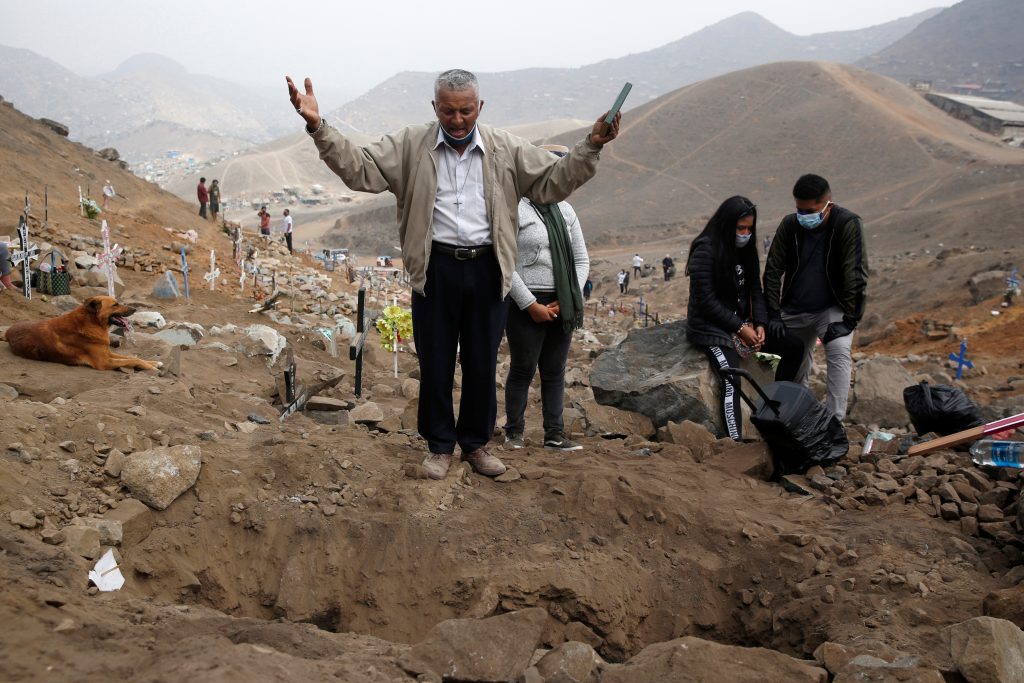If we’ve learned anything from months of isolation, fear, and uncertainty during the coronavirus (COVID-19) pandemic, it’s that life as we know it is fragile. The lives we led in 2019 look nothing like what we are living now, and many of us are mourning the changes. But Deacon James Keating, the director of theological formation for the Institute for Priestly Formation in Omaha, Nebraska, has some thoughts on why this reminder is not only necessary, but actually a blessing.
Kris McGregor: As a spiritual guide, you’ve always made a point to remind people to live in the present moment, where you are in this moment. But this moment is a mystery.
Deacon James Keating: The common experience right now is anxiety and vertigo, even spiritual vertigo. All of our idols are being confirmed as empty, and everything we cling to is being taken from us. We cling to the comfort of ordinary expectation — we all expect to get up in the morning and go from 8 a.m. to 9 p.m. in the way we expect it to be. Even our ordinary routine, which is comforting and gives us a sense of peace, that’s not guaranteed.
The wisdom of the saints comes back to us again and again. Of course, in good times, we never listen to the saints, because we’ve got this. And in bad times, we’re suffering so much that they can’t get their wisdom through to us because of our pain.
But the wisdom of the saints is this: Throughout our life, no matter what we’re experiencing, the suffering or enjoying, we should be seeking holy Communion.
The saints would counsel us that when this horrible virus passes, if we could just remember not to go back to being normal Americans, but to go back to Jesus, and get our interior life set, so that when the next reminder that everything on this planet is not forever comes, we’ll have less panic and more peace.
McGregor: What kind of communion are we called to, when so many of us still can’t receive the Eucharist?
Keating: A lot of human beings live this way — in isolation and loneliness. There’s a sense here that maybe the Holy Spirit wants us to grow in empathy for those who are always living in a state of only experiencing spiritual Communion.
We are spoiled, to some extent, with the physicality and availability of our own sacraments. But during this time of isolation, we may want to ask the Holy Spirit to deepen our gratitude for that. Maybe we can come out of this with a deeper gratitude for the availability of priests and the sacraments in our country.

McGregor: What would you say to people who feel like this is the End Times?
Keating: That feeling comes from, perhaps, an unmoored fear. It’s the normal state of being Catholic to be in holy Communion. It reassures us that nothing can separate us from the love of God, and so we live more deeply out of this peace.
All the horrendous things in our history, and this current one, where so many people are dying and suffering, it’s none of our business to discern the End Times. But this comes up when terrible things happen to us because we finally let ourselves experience our mortality.
Normally, we shield our mortality with our routine and with the expectations that come. But in times like this, where there is no schedule and things are uncommon, we touch our mortality. That makes us afraid, if we are not in holy Communion.
But this pandemic is not a clear sign that the end is coming. It could simply be a clear sign that we were never as deeply involved with the Holy Trinity as we thought we were, and now we’re scared.
McGregor: We always talk about encountering Christ, going to find Christ, but he’s always been in us. Is this an opportunity to come to a greater understanding of what that means?
Keating: Another thing we take for granted is that we’re part of the body of Christ, the community of Christ. Let’s hope that when this ends, we might gather together with a new resolve to actually be with one another in faith, to share our faith with one another, to pray together more deeply, to actually give testimony to one another as Catholics.
McGregor: There’s an underlying fear in this pandemic because death is truly possible, illness is possible, harm can come to us and our loved ones. How does that change our reflections?
Keating: Everything is preparing us for this moment of dying, when there are no more trappings to cling to, and we must confront the holy and the sacred and the divine. God is trying to gently give us this opportunity to be ready for death when it comes, so that we don’t run from it and try again in a puny, almost comical way, to cling to idols.
The reason there’s so much fear is because we are acknowledging that death is real. Most of our popular culture is a mask keeping us from ever thinking about that. And now, all these masks have dropped. Death comes to fore.
The deeper our friendship grows with Jesus Christ, the more we can confront death in peace, without panic, without fear. Of course, there’ll be sadness, there’ll be mourning, but the sadness and mourning is over the good things of life. The panic and fear is over that which we have created in ourselves, which is a habitual stance of isolation from God.
God is trying to say to us, “This death has always been here. Your limit and your finitude has always been part of your life. Stop masking it. Let’s look at real life. That’s why I came, so that you could not be alone.”
When you look at it, that’s what we call salvation. You’re looking at it from the stance of communion with him. That’s how the saints die in joy and peace.

